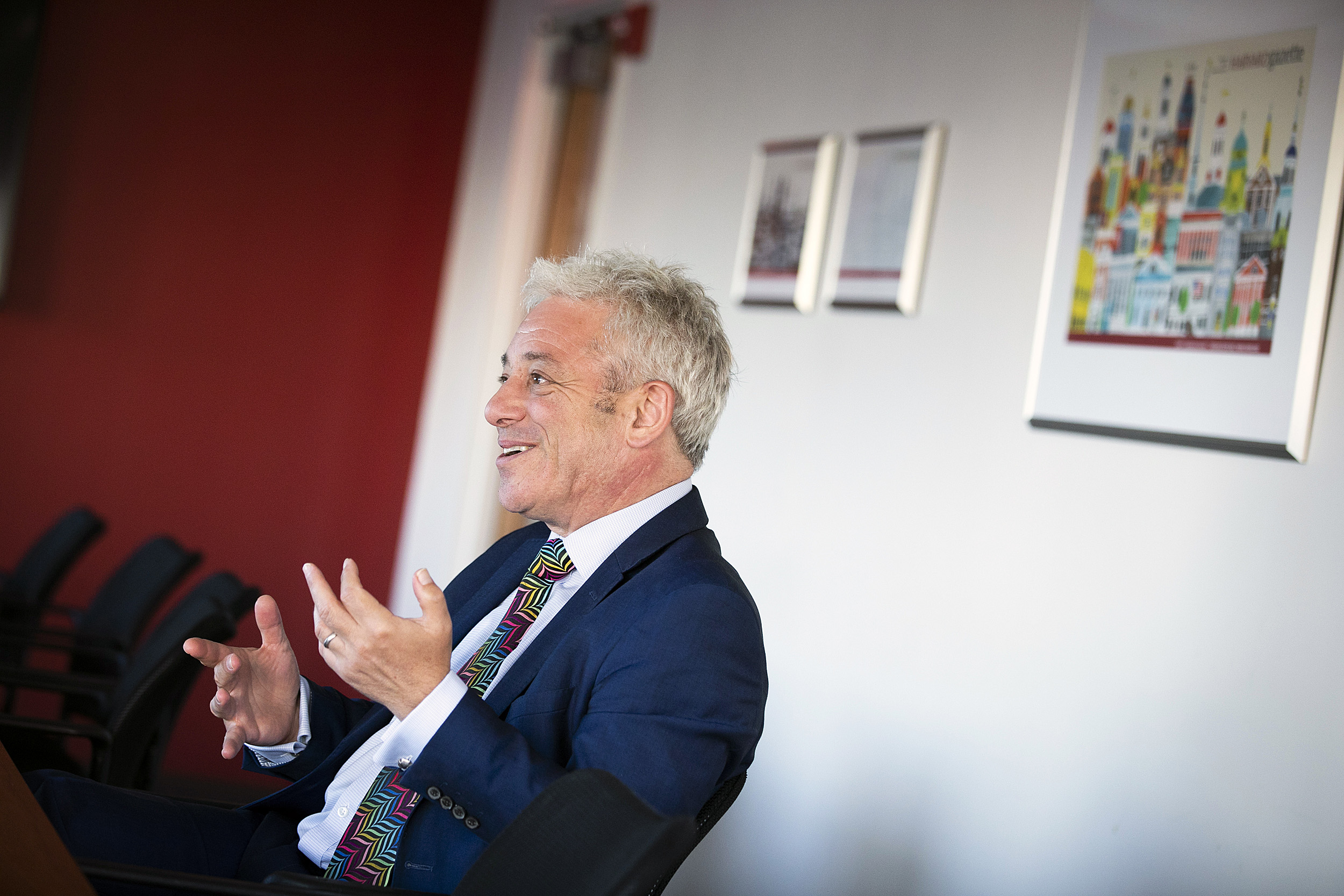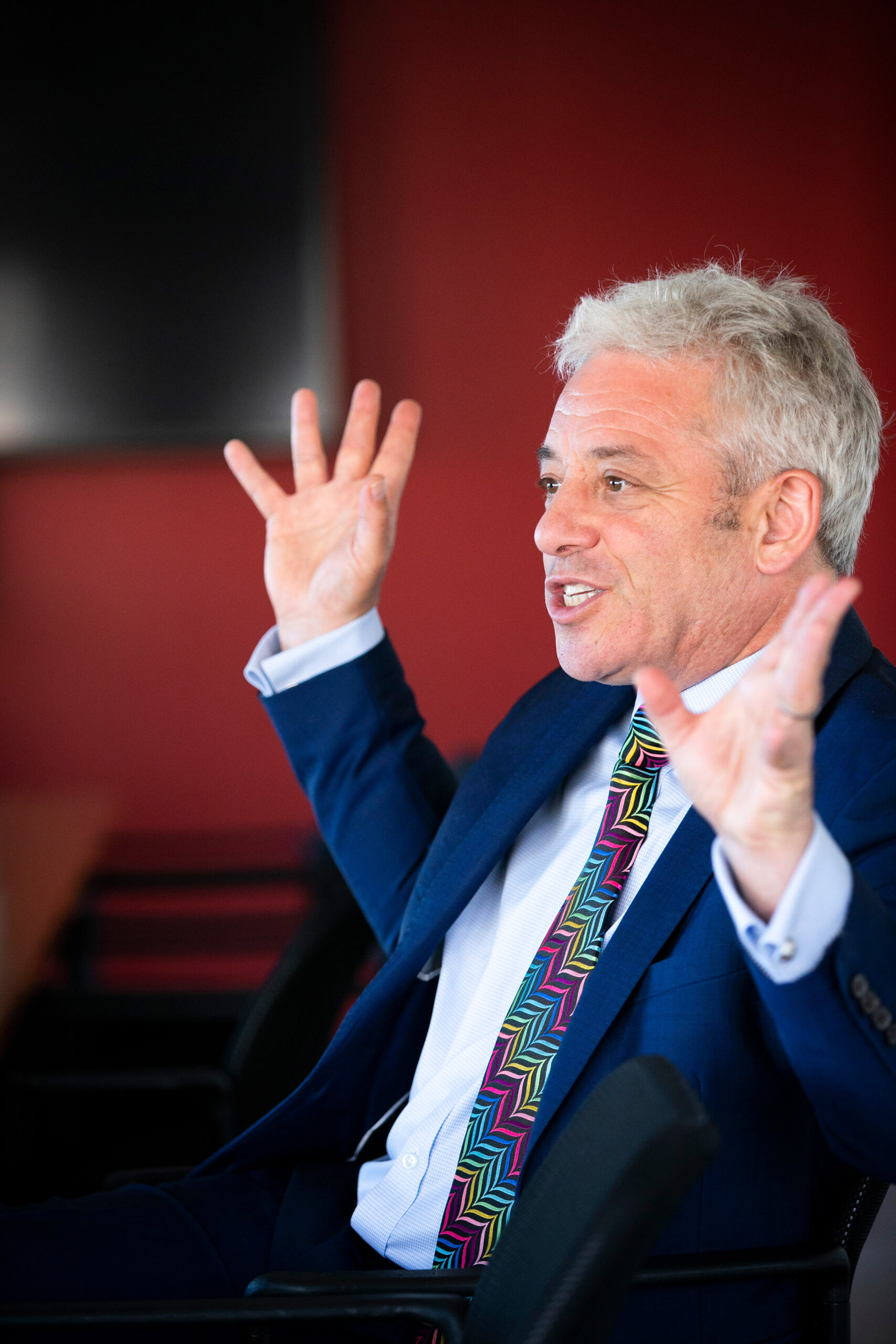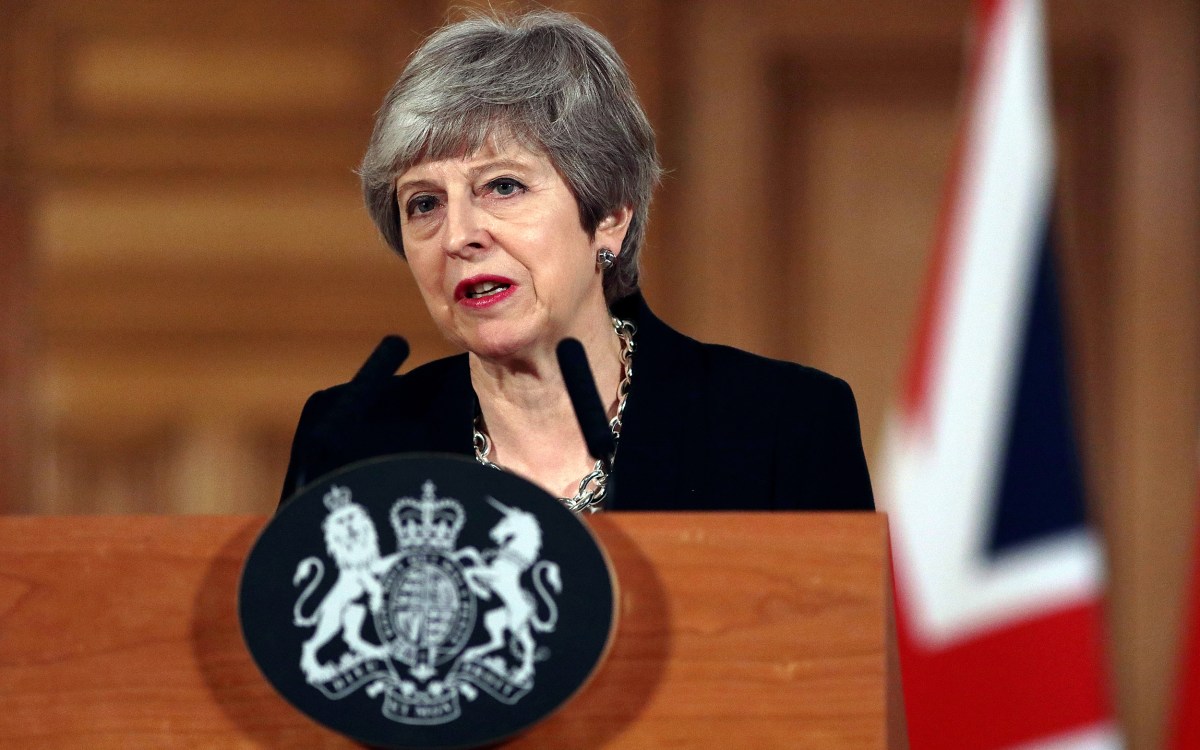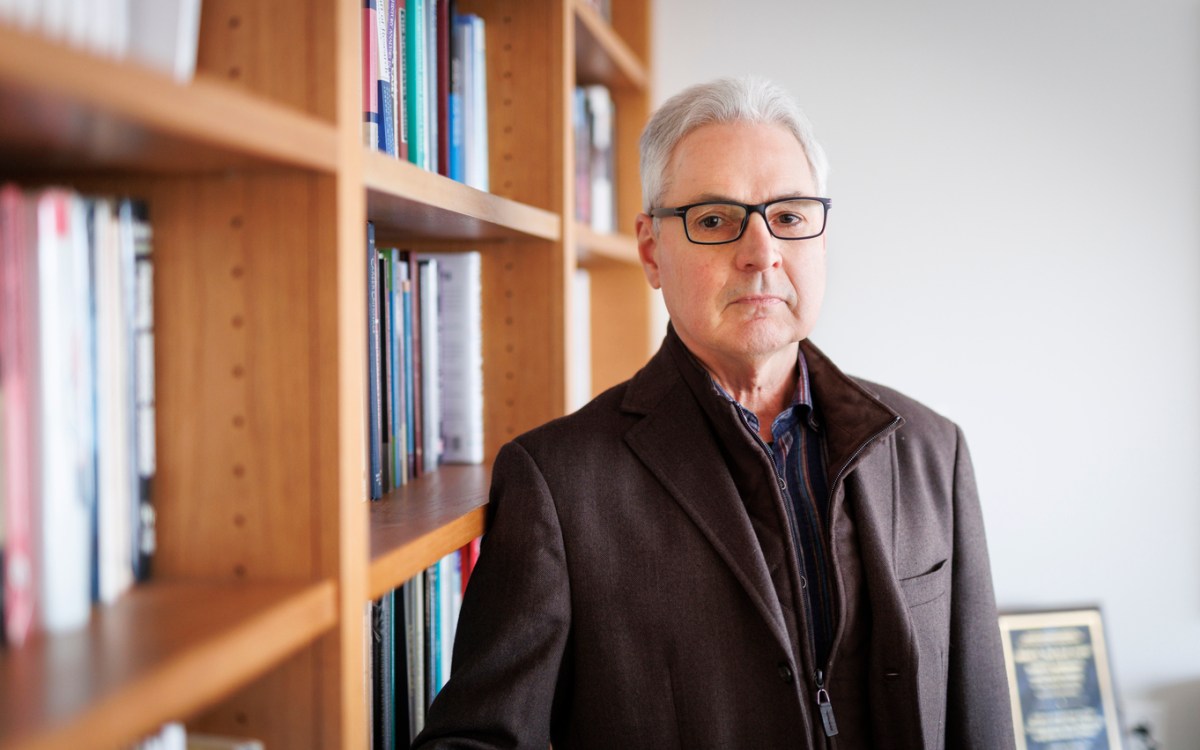
On Monday the man who has emerged as a celebrity of the Brexit debate, Speaker of the House of Commons John Bercow, came to campus during a brief break from his duty as official referee of the popularly elected legislative body.
Stephanie Mitchell/Harvard Staff Photographer
On the Brexit hot seat
John Bercow, the colorful speaker of the House of Commons, details the political battle that has turned him into an unlikely celebrity
John Bercow has become an unlikely international celebrity and YouTube star amid the heated, high-profile Parliamentary debate over Britain’s planned withdrawal from the European Union. Speaker of the House of Commons for a decade, Bercow has become famous for his sharp wit and scathing takedowns of rowdy colleagues, his bellowing calls for “Order!,” and his efforts to democratize Parliament by giving greater voice to backbenchers, or nonparty leaders. (A quick online search will yield several video compilations of him in action during the so-called Brexit deliberations.) Bercow, who has announced plans to step down from his post soon, was able to pay a visit to campus Monday to speak at the Harvard Kennedy School as Parliament is currently on hiatus until Oct. 14, a decision made by Prime Minister Boris Johnson, who is trying to rush Britain out of the EU by Oct. 31, with or without a transition agreement. In an interview with the Gazette, Bercow reflected on the Brexit discussions, what he does to relax, and the key qualities that make a great speaker.
Q&A
John Bercow
GAZETTE: Can you describe what the last three years have been like in the job as the U.K. has debated Brexit?
BERCOW: Fascinating, intense, and endlessly unpredictable. It’s been a richly stimulating period in which to be in the chair, a privilege of course at any time in one’s tenure but more, more testing, intriguing, and uncertain in terms of the vicissitudes of fortune and who will say what next on the Brexit question than in relation to any other time or subject over which I have presided.
I suppose the other thing to note is that in a democratic polity one is ordinarily dealing with and hearing about a vast panoply of issues at any one time. Democratic politicians have to juggle lots of different balls. You don’t just focus on one subject. I don’t say we have focused only on one subject, but the focus on Brexit has been so dramatically greater than on any other issue as to dramatically reduce the bandwidth for other subjects to be covered. That isn’t a political comment; it’s not intended to be a criticism, coruscating or otherwise, of any political party, any individual leader, any prime minister, any leader of the opposition, any third party. I think it’s just a commentary on how demanding and often all-consuming the Brexit issue has been. It is also, of course, a very dramatic example of the challenge that a Parliament faces in dealing with an issue about which the country is very heavily, some would say, almost equally divided.
GAZETTE: In announcing your plans to step down you said the House of Commons is “filled overwhelmingly by people who are motivated by their notion of the national interest, by their perception of the public good, and by their duty — not as delegates but as representatives — to do what they believe is right for our country.” Yet, if the people have decided on an issue such as Brexit, aren’t MPs supposed to uphold their vote?
BERCOW: Many people think that it is the responsibility of Parliament to translate into practice the result of the referendum. I am not arguing against that. I would simply say that it is a matter of political debate; it’s not a matter of legal necessity. And some would say it’s a matter of political necessity to implement the referendum result. I completely respect the fact that a lot of people would say that. But as speaker I have to recognize also, and I do so quite explicitly, that there are other views. There isn’t one view. There are those who say, “We gave the decision to the British people, and they voted as they did, by maybe a small, but nevertheless, a definite majority for Brexit, and therefore Brexit must follow.” And there are those who say, “Well no, it’s not legally binding, and the referendum was held in the last Parliament, and we can argue and argue and argue the toss over the issues.”
I am expressing myself carefully, because I am not trying to argue for one or other point of view. The only point as speaker of the Parliament I would make is this: The duty of a member of Parliament, and really ultimately the only duty, or certainly the overriding duty, is to do what he or she thinks is right for the country. Now, there will be people who will say, “Ah yeah, but if a member of Parliament upsets his party or her party nationally, the whip will be withdrawn.” Sure, that can happen; that’s a pragmatic consequence of particular behavior. If a member of Parliament upsets his or her local party, that member of Parliament may be deselected as a candidate for the next election. However, constitutionally, morally, the only duty of a member of Parliament is to do what he or she thinks is right, and we are a representative democracy. There will be people who will say, “Is he trying to rubbish the referendum? Is he saying the referendum doesn’t matter? Is he trying to defy, or deny or denounce the will of the people?” I am not seeking to do any of those things. That’s not for the speaker to do. The speaker’s job is to try to facilitate the fullest and fairest expression of opinion which exists in the House of Commons, and that is what I have consistently sought to do.
And I suppose I have just made the point that in relation to Brexit, we might leave with a deal; we might leave if Parliament so votes without a deal; or we might ask for further time, an extension of Article 50 [governing the withdrawal of a nation from the EU] in order to try again to resolve the issue. Any of those three is possible. But when people say: “This must happen or that must happen,” I don’t accept that. It seems to me it’s up to colleagues to decide how to take things forward. A lot certainly do think they have a responsibility to try to deliver Brexit, they most certainly do. But there are members of Parliament who say, “Well, I don’t think I have [that responsibility] at all.” Or there are members of Parliament who say, “Well, I think I’ve got a duty to try to see how it can be delivered in such a way as meets the verdict of the people but protects the country economically and, in security terms, strategically in the present in the light of all we know.” And these opinions will play out, and it’s not for me to put it simply either to facilitate Brexit or to stop Brexit.
Outspoken Speaker of the House of Commons John Bercow says having a sense of humor is important for a person in his role.

GAZETTE: How do you think Parliament has handled this debate over the past three years?
BERCOW: I may be in the minority in this respect. I think that the job of Parliamentarians is to debate and question and probe and scrutinize and challenge and posit alternatives, and there has been a lengthy exploration of the issues, and I know that there is a lot of frustration. So a lot of people would say “Well, Parliament hasn’t done well.” And there will be people on both sides who will say that. It’s quite easy to kick the cat called Parliament. There will be people who will say, “Well, Parliament has not succeeded, Parliament has failed because it’s 3¼ years since the referendum and yet we are still in the European Union and we should be out and the MPs have tried to block it, or they have failed to do their duty.” There will also be a proportion of the electorate who are against Brexit who will say, “Well, it was up to Parliament to intercede and to stop the process,” either by revoking Article 50 or by supporting a second referendum, or public vote, as it’s sometimes called.
So, in a sense, Parliamentarians are potentially, and in practice, actually, assailed from both sides by people who say, “They’ve made a mess of it.” I simply want to put a plea in mitigation on behalf of my colleagues. I want to say that I think that the MPs have considered the issues very seriously and keep coming back to the points of debate and looking at the issues again and again and putting forward alternative views; it’s what parliamentary politics is. I think it is better to “jaw jaw than war war,” as Churchill used to say.
And I completely understand the sentiment that says “Oh, just get on with it.” I completely understand that and I don’t sniff at that. But the “Oh, just get on with it,” is not necessarily a guide to best policy. So if it takes a bit longer to resolve this matter, well, so be it. I think it’s more important to try to get it right than to say we’ve got to meet this deadline; we’ve got to finish by this precise point, i.e., we’ve got to finish in 2017, or we’ve got to finish in 2018. The government perfectly legitimately brought forward a withdrawal agreement in November last year. That agreement was rejected in three situations. I think it was brought forward in slightly different forms a total of three times, and it was rejected by different and gradually decreasing majorities, but it was defeated on all three occasions. And it’s now up to Parliament to decide how to take things forward. We have a new prime minister; he’s got his own approach. He’s made it clear he is seeking a deal within the European Union, but he is absolutely committed to the proposition that the U.K. should leave by the end of October, and we just have to see what happens. I don’t vote unless there’s a tie.
GAZETTE: What will you do if the prime minister tries to go circumvent Parliament with Brexit?
BERCOW: Well, I think I have always been clear in my own mind, and I’ve said publicly that the idea that Parliament will be evacuated from the center stage of decision-making in relation to Brexit is unimaginable. It is true we have been prorogued, and there is a debate going on about that prorogation, and I have expressed my views publicly about that. We are of course due to come back in any case on the 14th of October, and I am sure there will be a very full opportunity for these matters to be further debated. And it is also a matter of fact that earlier this month Parliament passed a bill [prohibiting] a potential no-deal Brexit before the 31st of October, which made very clear what Parliament thought about the matter. That bill is now an act; it has received royal assent; it is law and of course it must be completely uncontroversial to say that in all circumstances, adherence to the law is vital.
GAZETTE: In your role, it must be hard to be the impartial referee trying to make everything run smoothly. Isn’t that stressful?
BERCOW: Well, I don’t find it stressful. I did an interview with someone the other day from the London Evening Standard who pointed to a portrait of me that was unveiled at the Speaker’s House at the end of 2011. And he said to me, “Mr. Speaker, have you aged?” And I said “Of course I’ve aged. I’m nearly eight years older than when that portrait was unveiled.” So I haven’t got a bit of grey hair; I’ve got very silver or white hair, but I am growing old gracefully, and I am very relaxed about that.
I don’t feel stressed day to day. I regard it as the most enormous privilege. But look, the truth is that it is impossible to satisfy everybody. My claim is that I have always tried to ensure that every voice is fairly heard, and at various times different people have been what you might call the challenger minority. So there was a time when the Brexiteers were the challenger minority on the government benches to a Conservative government that was in favor of staying in the European Union. And I always used to take the view, it’s a matter of record, that the challenger minority has a right to be heard. And it may not be convenient for the government, for the Cameron-Clegg government, or for a year the Cameron government from 2015 to 2016, but those views must be heard; those questions must be put; those challenges to the government must be allowed to be articulated. And the speaker should assist people who want to put those points of view, even though they may be in a minority on their own side and in a small minority across the House.
“The only point as speaker of the Parliament I would make is this: The duty of a member of Parliament, and really ultimately the only duty, or certainly the overriding duty, is to do what he or she thinks is right for the country.”
GAZETTE: The House of Commons has a history of illustrious speakers. In your mind, what are the top five attributes every speaker should have?
BERCOW: Good memory. Sense of fair play. Guts to stand up for Parliament, even if there is pressure not to do so. Physical stamina. And good concentration.
GAZTTE: What about a sense of humor?
BERCOW: And a sense of humor is important, yes. I have sometimes been accused of being irascible with people. You can sometimes be sitting in the chair for a long period, or there may be a very hyper atmosphere; it’s high-octane; it’s quite volcanic. And everybody is human, so sometimes I can be irascible. I think measured over the 10 years, the record would show that I have tried to use humor more as I have been in the post longer. Just slapping people down might work there and then, but it’s rather a blunt instrument. I think if one can tease people gently a bit one should try. The noisiest member of the House is Karl Turner, the Labour member for Kingston upon Hull East, who tends to yell at the government. “Shocking! It’s a disgrace!” he says, and then he points at a minister and says “Behave!” whilst conspicuously failing to do so himself. So I have tended to tease him that he should go and lie down in a dark room, take some sort of soothing medicament, and he’ll probably feel better.
GAZETTE: Is he the one you advised to take up yoga?
BERCOW: That was another member who has left the House now, Tom Blenkinsop. I encouraged him to take up yoga, and his brother bought him for Christmas a book about yoga, and I was asked to sign it. And for about three months Tom seemed to calm down, and then all of a sudden he exploded one day, and I said “To Mr. Blenkinsop, on my good advice that you should take up yoga, your brother bought you a book about the subject, which I was invited and was very content to sign, but sadly it’s evident to me that you’ve not even read the first chapter.”
GAZETTE: What do you do yourself to relax? Do you do yoga?
BERCOW: No, I don’t but perhaps I should. Apart from interacting with my own family, which is a great leveler, it really puts things in perspective. Your kids are brilliant at bringing you back down to earth and focusing you on things that matter at home or to them. What do I do? The answer is I play and watch tennis. I am shortly to watch the Laver Cup [exhibition tennis tournament] in Geneva. Basically, I love watching tennis, and I love watching Roger Federer in particular, I would go anywhere in the world to watch Roger. I have seen him play in Paris, and in Basel and in London at Wimbledon and the O2 [stadium] many, many, many times. I’ve not seen him play in Geneva. I am very much hoping to see him in a few days’ time play there. So that I love.
And I love watching football, and in particular my team, Arsenal. And when I am either playing tennis or watching tennis or watching football, I completely switch off from anything else. It’s a great sort of restorative. You just sort of brush out everything else, and I think that’s really important. I am quite a passionate fan. I am rather un-British in the sense that if the British thing — less so in football matches, where there is a culture of noise and chanting and so on — but if the culture of tennis is people sit there and clap quietly, that’s not me. I am up on my feet at Wimbledon: “Roger, you are a genius, a hero, an icon man!” That’s very much my style. I like being in ordinary seats and being able to wear my RF shirt and my RF cap.
GAZETTE: Have you met him?
BERCOW: Yes, I’ve been very lucky. I’ve gotten to meet Roger Federer a number of times, and I interviewed him for the BBC “Today” program over Christmas as a guest presenter in 2014. He is grace personified. He came to speak at the House in Westminster last year for a pre-ATP World Tour Finals launch party. He stayed longer than any of the other players, posed for more pictures, chatted to more people. He is a class act. You know what they say: Form is temporary; class is permanent. There are other magnificent champions, but for me he is the greatest player I have ever seen.
Interview was edited for clarity and condensed for space.







